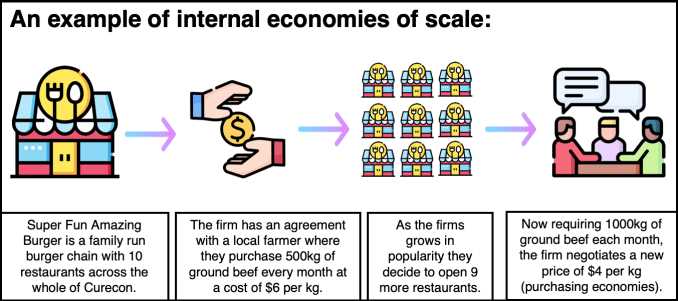What are Economies of Scale?
Economies of scale refer to the cost advantages that a company can achieve as it increases its production output. In simple terms, it means that as a company produces more goods or services, its average cost per unit decreases. This decrease in average cost can be attributed to various factors, such as spreading fixed costs over a larger output, gaining access to bulk discounts on raw materials or inputs, and improving operational efficiency.
There are two main types of economies of scale: internal and external. Internal economies of scale are derived from factors within the company’s control, such as increasing the size of production facilities, implementing better technology, or improving employee skills. External economies of scale, on the other hand, are derived from factors outside the company’s control, such as industry-wide improvements in infrastructure, availability of skilled labor, or favorable government policies.
Economies of scale can have a significant impact on a company’s profitability and competitiveness. By achieving lower average costs, companies can offer their products or services at lower prices, attracting more customers and gaining a larger market share. This can lead to increased revenue and higher profits.
Furthermore, economies of scale can also provide companies with a competitive advantage by allowing them to invest in research and development, expand their product offerings, or enter new markets. The cost savings achieved through economies of scale can be reinvested in the business to drive innovation and growth.
Benefits of Economies of Scale
Economies of scale refer to the cost advantages that a business can achieve when it increases its output and expands its operations. These cost advantages can result in various benefits for the business, including:
1. Cost Reduction
One of the primary benefits of economies of scale is cost reduction. As a business increases its production volume, it can spread its fixed costs over a larger number of units, resulting in lower average costs per unit. This can lead to increased profitability and competitiveness in the market.
2. Increased Efficiency
Expanding operations and increasing output often require businesses to invest in new technology, machinery, and infrastructure. This investment can lead to improved efficiency in production processes, as newer and more advanced equipment can perform tasks more quickly and accurately. As a result, businesses can produce more goods or services with the same or fewer resources, further reducing costs and increasing productivity.
3. Better Negotiating Power
Large-scale businesses that benefit from economies of scale often have more bargaining power when dealing with suppliers and other business partners. They can negotiate better terms, lower prices, and favorable contracts due to their larger purchasing volumes. This can result in cost savings and improved profitability for the business.
4. Market Dominance
Businesses that achieve economies of scale and can offer their products or services at lower prices than their competitors often gain a competitive advantage in the market. Lower prices can attract more customers and increase market share, leading to increased sales and revenue. This can help the business establish itself as a dominant player in the industry and create barriers to entry for potential competitors.
5. Innovation and Investment

With the cost savings achieved through economies of scale, businesses can allocate more resources to research and development, innovation, and investment in new technologies. This can help them stay ahead of the competition, develop new products or services, and improve existing ones. By continuously investing in innovation, businesses can maintain their competitive edge and adapt to changing market conditions.
How to Utilize Economies of Scale
Utilizing economies of scale can be a strategic advantage for businesses, allowing them to reduce costs and increase profitability. Here are some key strategies to effectively utilize economies of scale:
| 1. Increase production volume | One of the most straightforward ways to benefit from economies of scale is to increase production volume. By producing more units, businesses can spread their fixed costs over a larger number of products, resulting in lower average costs per unit. |
| 2. Negotiate better deals with suppliers | As businesses grow and increase their purchasing power, they can negotiate better deals with suppliers. By buying in larger quantities, businesses can secure lower prices for raw materials, components, and other inputs, further reducing their costs. |
| 3. Invest in efficient production technology | Investing in efficient production technology can help businesses achieve economies of scale. By automating processes and improving productivity, businesses can produce more output with the same amount of resources, leading to cost savings. |
| 4. Expand into new markets | Expanding into new markets can help businesses increase their customer base and sales volume, allowing them to benefit from economies of scale. By reaching a larger audience, businesses can spread their fixed costs over a wider customer base, resulting in lower average costs. |
| 5. Streamline operations and eliminate waste | Efficiency is key to achieving economies of scale. Businesses should continuously analyze their operations and identify areas where waste can be eliminated. By streamlining processes and reducing inefficiencies, businesses can lower their costs and improve their overall productivity. |
By implementing these strategies, businesses can effectively utilize economies of scale and gain a competitive edge in the market. However, it is important to carefully analyze the potential risks and challenges associated with scaling operations to ensure a successful implementation.

Emily Bibb simplifies finance through bestselling books and articles, bridging complex concepts for everyday understanding. Engaging audiences via social media, she shares insights for financial success. Active in seminars and philanthropy, Bibb aims to create a more financially informed society, driven by her passion for empowering others.
